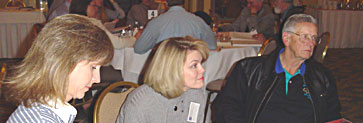Driving back to my hotel, I felt exhausted. I had just spent four days at the Defense Systems Management College, meeting with 12 small groups of program management students to discuss a case study they had just completed. I was there to give the students a chance to ask questions that they felt the case study had not answered.
While I drove I found myself wondering why I had dedicated so much time and energy to this work. It wasn’t as if I had no idea what I was getting into. I had been doing this three times a year for the past three years. And it sure wasn’t because I had nothing else to do. I was managing one of the Air Force’s largest and most important programs. That by itself was more than a full-time job.
Nor was it because I liked to hear myself talk. An introvert by nature, I don’t fashion myself a professional educator. Nor did I expect some tangible reward or recognition. I knew that I was as high in the pecking order as I was ever going to get and while the school appreciated my service, I am not sure my boss would be happy if he realized how much time I was spending at this.
So why was it worth it?
I thought back on the day. Many of the questions were ones that I had heard over and over. For these I had stock answers; however, in almost every section I got a few new questions that really forced me to reflect. “What were you thinking when you…?” “Why did you make the choice to…?” “Did you consider…?” “If you had it to do over again would you still…?”
As I thought about my answers, I soon realized that these students were teaching me to think about things I had never thought of before. They were enriching my experience in a way that I could have never anticipated. It was a richness I was convinced made me better in the job I was doing.
I also thought about the students and reflected on my experience there as a student almost ten years ago. I had left the school with my head crammed with facts, but with none of the practical knowledge or insights to understand what the day-to-day life of a project manager was really like.
In my training there had been no opportunity to interact with real practitioners — no opportunity to hear real first-hand anecdotes or war stories that would take me beyond the theory. What are the tough decisions? What is most important when everything seems important? How do you deal with risk and adversity? What’s the role of intuition, values and judgment in the decision process? How do you deal with dysfunctional teaming relationships? How do you handle higher-ups when they demand that you do something you think is unwise? How do you recover after a mistake?
I felt like these students, partly as a result of my having shared my time with them and given candid answers to their questions, would have a much better understanding and ability to deal with these sorts of real world issues than I had when I left school. Hopefully, they will not have to learn as many things the hard way as I did. Hopefully, they will understand that the most difficult issues they face rarely have a pat answer.
As I continued towards the hotel, I began to feel exhilarated even. These students and their eagerness to learn, their zest to grow as professionals, had recharged my old batteries — cracked through some of my cynicism and made me feel more vital than ever. What I had done was the right thing for the students, for the Department, and for me.
Was it worth it? Absolutely!! I had struck a blow for progress.








